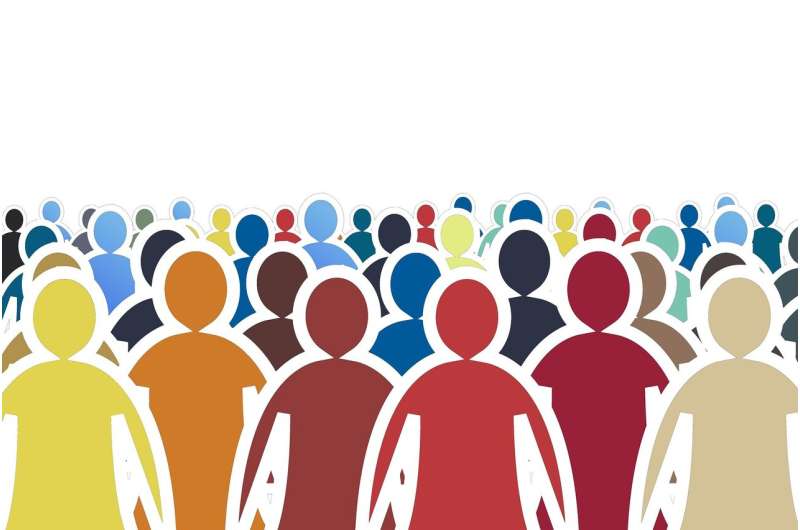Societies where generations fall short of their parents' social and economic status have a higher death rate

Societies in which people fail to exceed their parents' social and economic status have a higher death rate than those where they do, in part because of factors such as assaults and suicide, new research shows. In the published study, titled "Equality of opportunity is linked to lower mortality in Europe," two University of Oxford scholars found the increased mortality rate could be connected with stress caused by feeling that society is unfair.
Social scientists Alexi Gugushvili and Caspar Kaiser analyzed survey data on 163,467 people in 30 European countries, including the U.K., in different age and national groups. They correlated the intergenerational change in people's socio-economic status ranked by the type of job they are doing, and the official death rates of these groups.
They revealed that the effect was strongest for men in poorer social groups who only attain the same socio-economic position as their parents. These men had a mortality rate up to 11 percent greater than men in similar groups who exceeded their parents' socio-economic status.
The study also found that:
- Men with parents from the lowest socio-economic quarter who ended up on average with a socio-economic status twice as high as their parents had a rate of mortality 9 percent lower than for similar men who only matched their parents.
- Women's death rate was 6 percent higher in those groups in which those at the bottom only matched their parents' status compared to those groups that exceeded it.
- In societies where life chances were distributed more unequally, deaths from causes such as assaults and suicides were up to 13 percent higher.
The researchers identified three types of health problems that lack of equality of opportunity had raised levels of: diseases of the respiratory system, diseases of the nervous system and the sense organs, and external causes of death, such as from assault and suicide.
Respiratory and neurological diseases could be accounted for by smoking, unhealthy diet and lack of exercise, as well as pollutants, they said, but assaults and suicides could come from a deep-seated sense of injustice.
Study author Dr. Gugushvili said: "Assuming that individuals' health is affected by psychological factors, a perceived lack of fairness in the distribution of life chances and limited possibilities for upward intergenerational mobility may cause anxiety and hopelessness among individuals and gradually compromise their health."
"Perhaps the most explicit channel linking equality of opportunity and mortality is the group of causes of mortality which includes deaths due to assaults and intentional self-harm. Inequality of opportunity can facilitate tensions and consequently violence in society if some individuals perceive their lack of upward mobility chances as unfair and unjust."
He said that they found different results when analyzing effects on death rates for men and women separately:
"Men appear more likely than women to attribute failure to factors that are beyond their control and more likely to explain successes by pointing to their own merits, abilities and effort. For instance, men who experience upward intergenerational mobility are more likely than their female counterparts to exhibit lower levels of psychological distress."
The study also found different results when analyzing effects on death rates for men and women separately: "Men appear more likely than women to attribute failure to factors that are beyond their control and more likely to explain successes by pointing to their own merits, abilities and effort. For instance, it might be that men who live in environments with higher equality of opportunity and who experience upward intergenerational mobility are more likely than women to exhibit lower levels of psychological distress"—said the researchers.
The researchers adjusted their statistical analysis to rule out various factors such as education, marital status, income and employment so that the effect of intergenerational mobility in socio-economic status on mortality could be studied in isolation.
Socio-economic status was measured using the International Socio-Economic Index of Occupational Status. This is an internationally validated measure of occupational status which is widely used in comparative research. It rates jobs on a scale from 16, indicating low status jobs, to 90, indicating high status jobs. High status jobs are those with higher incomes and prestige employing people with much higher levels of education.
The researchers aggregated data for 1,200 population groups (of different age groups, years they were interviewed for the survey and different countries) from the European Social Survey in the years 2002-2010. The 30 countries were: Austria, Belgium, Bulgaria, Croatia, Cyprus, Czech Republic, Denmark, Estonia, Germany, Finland, France, Greece, Hungary, Iceland, Ireland, Italy, Latvia, Lithuania, Luxemburg, Netherlands, Norway, Poland, Portugal, Romania, Slovakia, Slovenia, Spain, Sweden, Switzerland, and the United Kingdom.
More information: Gugushvili, Alexi & Kaiser, Caspar (2019). Equality of opportunity is linked to lower mortality in Europe. Journal of Epidemiology and Community Health. DOI: 10.1136/jech-2019-212540
Journal information: Journal of Epidemiology and Community Health
Provided by Erasmus University Rotterdam

















